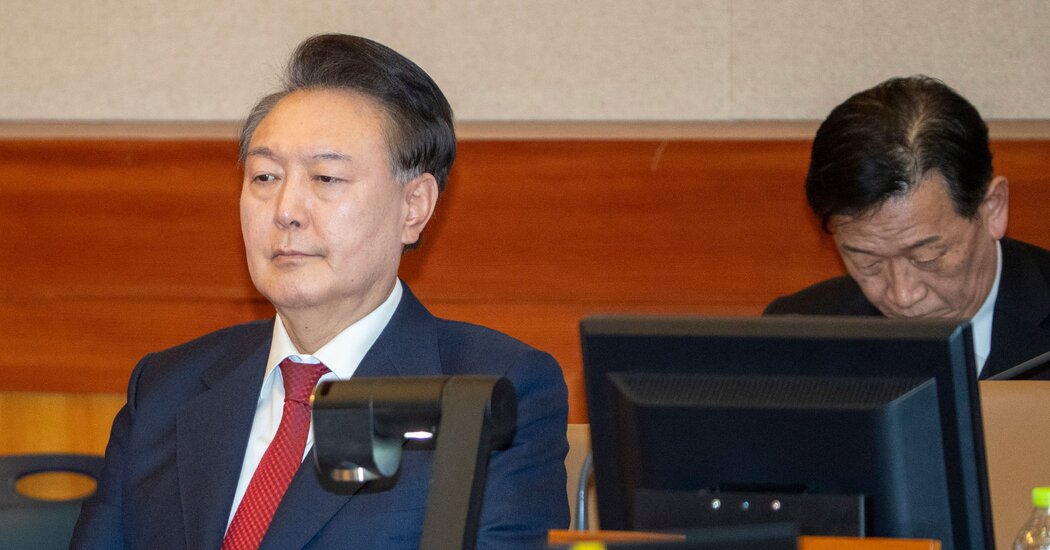A South Korean court on Friday ordered the release from jail of Yoon Suk Yeol, the country’s impeached president, who is standing trial on insurrection charges over his decision to impose martial law in December.
The Seoul Central District Court ruled that prosecutors had violated procedural rules by holding Mr. Yoon in detention longer than legally allowed before indicting him in January.
But Mr. Yoon was not immediately freed from the detention center south of Seoul where he is being held, said one of his lawyers, Seok Dong-hyun. Prosecutors have a week to appeal the ruling, during which time Mr. Yoon will remain in custody, Mr. Seok said.
Mr. Yoon was detained on Jan. 15 and formally indicted 11 days later on the insurrection charges, which stem from his short-lived imposition of martial law in December. His lawyers have fought since then to get him freed from jail, making the argument that a three-judge panel accepted on Friday: that prosecutors had held Mr. Yoon longer than the law permitted.
The ruling was limited to a narrow dispute over whether prosecutors had followed all procedures correctly when they arrested and indicted Mr. Yoon. It did not address the charges that Mr. Yoon faces at his criminal trial.
Mr. Yoon declared martial law on Dec. 3, accusing the opposition-controlled National Assembly of “paralyzing” his government. The assembly voted against his martial law decree, forcing him to rescind it after about six hours. But it has set off South Korea’s worst political crisis in decades.
As protesters called for Mr. Yoon’s ouster, the Assembly impeached him on Dec. 14, suspending him from office. The country’s Constitutional Court is deliberating whether the impeachment was legitimate and if he should be formally removed from office. Separately, criminal investigators detained Mr. Yoon on the insurrection charges.
He is the first president in South Korean history to face criminal charges while still in office.
The unprecedented nature of the case against Mr. Yoon has helped spawn a host of legal disputes between his lawyers and prosecutors. One of them was how long the warrant prosecutors used to detain Mr. Yoon on Jan. 15 was valid.
In its ruling on Friday, the court said that the warrant expired hours before prosecutors indicted Mr. Yoon on the evening of Jan. 26. By law, if prosecutors fail to indict a criminal suspect before such a warrant expires, the suspect must be released from custody.
The court said that if disputes over such procedural matters were not resolved now, the legitimacy of the future ruling on Mr. Yoon on insurrection charges could be called into question.
“Today’s ruling may look confusing but doesn’t really change anything fundamental, except that President Yoon will now likely go through trial as a free man,” said Sung Deuk Hahm, a professor of political science at Kyonggi University, west of Seoul.
Mr. Yoon’s lawyers and his People Power Party welcomed the court’s ruling on Thursday. They said Mr. Yoon should be allowed to defend himself in court as a free man. But the main opposition Democratic Party, which spearheaded Mr. Yoon’s impeachment, denounced the ruling, urging prosecutors to appeal it.
If Mr. Yoon is released from jail, it is likely to enliven his supporters, who have held rallies in downtown Seoul in recent weeks, calling his impeachment and arrest a “fraud” engineered by his political enemies.
Earlier Friday, an elderly South Korean man was taken to the hospital after he set himself on fire in downtown Seoul, police said. They did not provide details on his motive or condition but said that leaflets expressing support for Mr. Yoon were found around him.
#South #Korean #Court #Orders #Impeached #Presidents #Release #Jail










